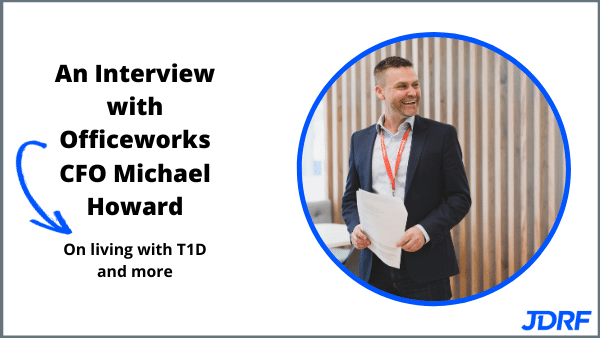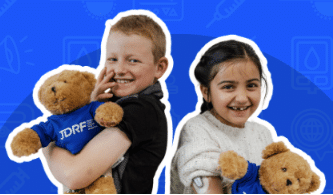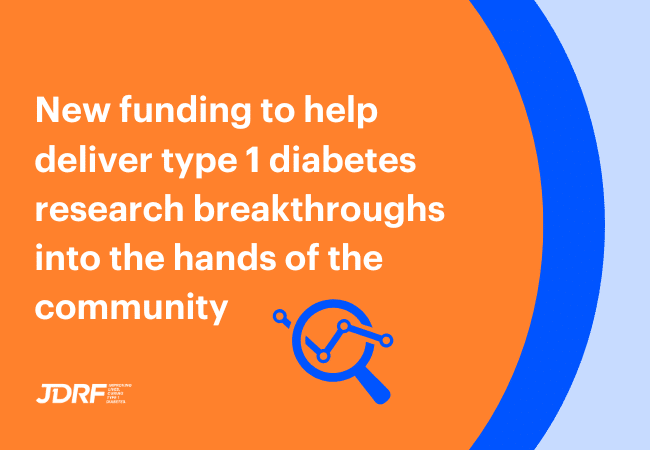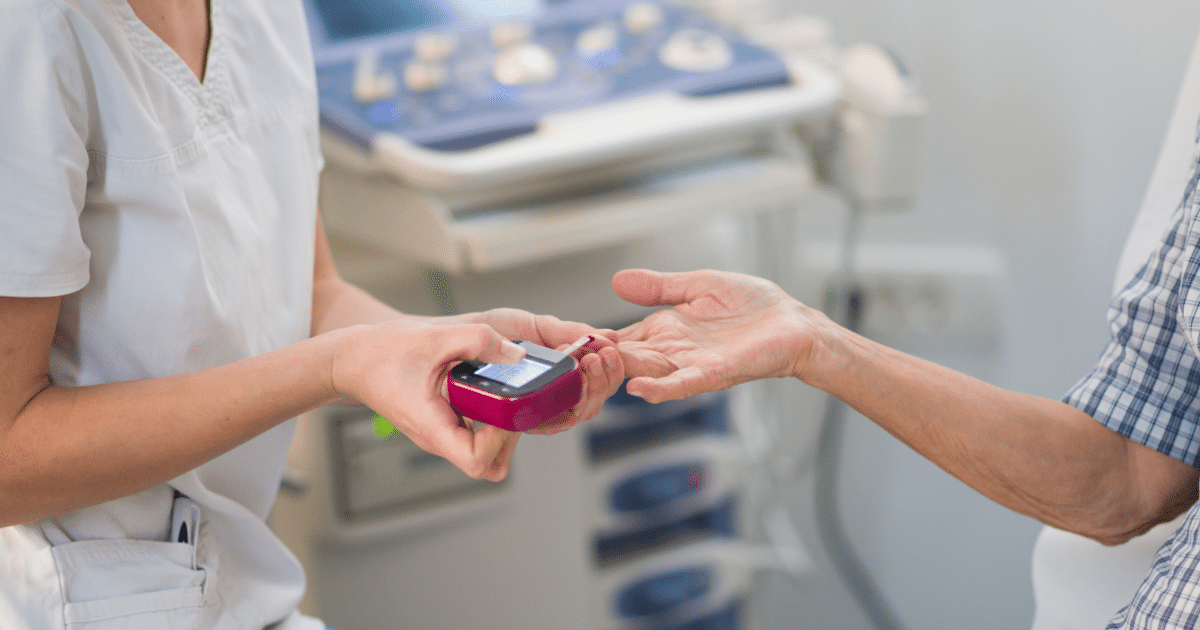Living with T1D for almost 40 years: a conversation with Officeworks CFO Michael Howard
Michael Howard is the Chief Financial Officer at Officeworks – Australia’s largest supplier of office and stationery products. A lesser known fact about him is that Michael has lived with type 1 diabetes (T1D) for almost 40 years since his diagnosis close to his 11th birthday. We recently caught up with him in this candid and humorous interview where he shares his T1D diagnosis story, how living with T1D has impacted his life and what advice he would give to someone just starting out in their career.

When were you diagnosed with type 1 diabetes (T1D)? Could you tell us a bit more about your diagnosis?
I was diagnosed on 10th March 1981, just a couple of months prior to my eleventh birthday. I didn’t really even know what diabetes was at that stage so spending a couple of weeks in hospital to get everything under control was a bit of a shock. I’d been drinking copious amounts of water and spending a lot of time going to the toilet so I suspect Mum knew something was amiss.
The one thing I remember about my time in hospital was how good the nurses were to me. In the age of COVID-19, the glowing tributes being paid to our nurses is not a surprise to me based on my experience many years ago.
The other thing I remember most was how upset my Mum was at the time although she did a great job (usually) of hiding it. I didn’t quite understand why she felt that way at the time – after all, I had the diabetes, not her – but, of course, when you become a parent yourself, it makes a bit more sense. For all those parents out there with recently diagnosed children, I can assure you that kids are a lot more resilient than us oldies and whilst there is a period of adjustment, life goes on.
What do you wish more people knew about living with T1D?
I think most people think T1D is about sugar and injections. That is, you can’t have any sugar and you get to have lots of injections. Of course, things are never quite that simplistic.
How has living with T1D impacted your career? Could you tell us a little about any memorable challenges or highlights and how you’ve dealt with them?
To be honest, I don’t think it’s impacted my career one iota. Whatever I have or haven’t achieved over my career has been attributable to a whole bunch of other factors other than type 1 diabetes. There’s been some challenges over time – the odd hypo in an executive meeting had a few people thinking I’d started having a drink early in the day – but, generally, speaking, I have managed to get by without my T1D running too much interference.
What advances in T1D management have you seen in the time you’ve been living with this condition?
The one thing I am really appreciative of is how small the injections are these days compared to what they used to be like. I used to inject into my legs because it was just easier when you’re learning how to do it right. It still sends a shudder up my spine thinking back to those days. Today, it’s a very small pin prick into the stomach 5 – 6 times a day – much easier!!
The other major advancement they’ve made is with eye health. Many readers will know that T1D can impact the tiny blood vessels at the back of the eye. A few years ago, I’d started to have trouble seeing out of one eye – it was like trying to see through a thick fog. My ophthalmologist performed a vitrectomy which is where, in simple layman’s terms, the jelly in the middle of the eye is removed and replaced with saline. Unfortunately, post operation number one, some of the other blood vessels in the same eye started leaking and so I lost my vision again. My family and friends thought that perhaps losing sight in one eye was apt given my love for the Collingwood Football Club but this wasn’t quite what I had in mind as a one-eyed Pies fan!! Unfortunately, things got even worse from that point since my other eye started to do the same thing. Effectively, I’d lost the sight in both eyes. That was a pretty scary period in my life. Thankfully, my ophthalmologist was amazing – after a few weeks, he fixed both eyes up and – touch wood – they’ve been great ever since. This sort of surgery hasn’t been around for all that long so I know I’m extremely lucky to have my full vision back.
Do you find it challenging to balance T1D with such a senior role and other aspects of life? Why/why not?
I tend to think about T1D as an organisational challenge. You need to be organised to be able to eat the right things at the right time. You need to be organised to be able to exercise. You need to be organised to test blood glucose levels and have your injections. In some ways, though, operating effectively in any organisation, whether in a senior role or not, is as much about how organised you are as anything else. Most people are pretty busy these days – there always seems to be more to do than there is time to do it, both at work and at home. If you’re organised and can prioritise what is truly important, you can operate effectively, whether you’re a type 1 diabetic or not.
What advice would you give to those living with T1D who are just starting out in their career?
To be honest, I’d give the same advice whether they were living with T1D or not. Do what you’ve got a real passion for – for me, that’s working in customer-facing organisations like Officeworks. Make sure you look after yourself whilst doing it – eat well and exercise. And, finally, accept that you’re not going to manage your T1D perfectly every day and it’s OK to break the ‘rules’ occasionally.
Why is Officeworks supporting JDRF in the Round Up to Make a Difference initiative?
As you can imagine, young people are one of our biggest cohorts of customers, particularly during our back-to-school program each year. So, from that perspective, we thought the JDRF fit nicely with Officeworks. In addition, whenever we do any sort of fundraising, we like to get the team involved because, frankly, we get a better outcome when they’re all involved. And so many of our team members have a connection in one way or another with a type 1 diabetic – a son or daughter, sister or brother, friend or neighbour. So, when we were thinking about how we would run Round Up to Make a Difference this year, we thought partnering with JDRF would work perfectly. Like always, the team have absolutely thrown themselves into it, coming up with all sorts of ways to help raise money. Despite the fact that they’ve had a very challenging year already, the enthusiasm of the team for causes like this knows no bounds.
How does the Round Up to Make a Difference campaign work?
We saw the concept many years ago in the United States. In effect, when you make a purchase at Officeworks, you can round-up your purchase to the nearest dollar and we’ll make sure those extra cents get forwarded to our chosen charity, in this case being JDRF. Of course, many of our customers go well beyond just rounding up to the nearest dollar and so by the end of the three-week program, we’re hoping to have raised a lot of money for a very worthy cause. Knowing what our team and our customers are like, I’m confident we’ll all be pleasantly surprised by how much money we’ve raised for JDRF by the end of it. And if that helps bring a cure one step closer, it’ll have been absolutely worth it.
The Officeworks Round Up to Make A Difference Campaign is running at 12 stores in Melbourne until 5 July 2020: Officeworks Bayswater, Camberwell, Chadstone, Doncaster, Glen Waverley, Ringwood, Box Hill South, Carnegie, Chirnside Park, Ferntree Gully, Kew East, Vermont South




